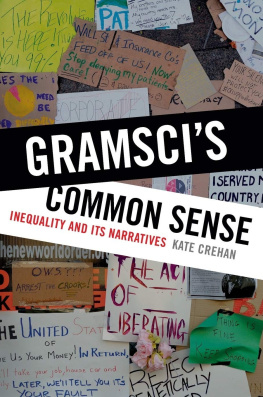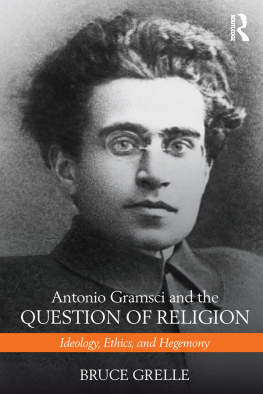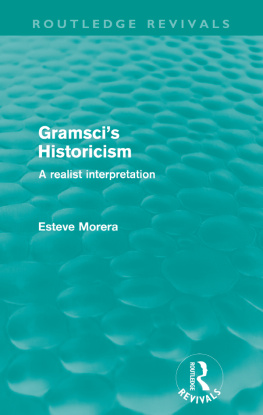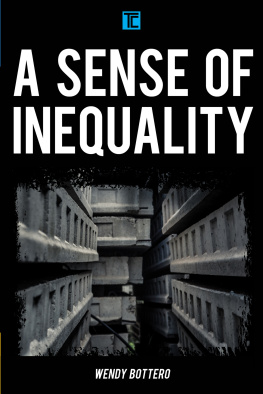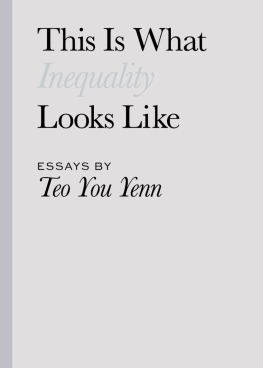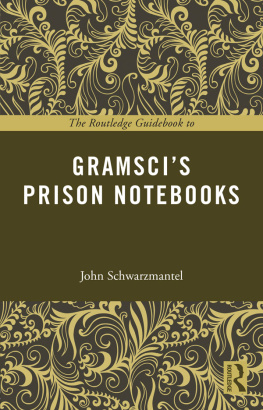Gramscis Common Sense
Kate Crehan
Gramscis Common Sense
INEQUALITY AND ITS NARRATIVES
Duke University Press / Durham and London / 2016
2016 Duke University Press
All rights reserved
Printed in the United States of America on acid-free paper
Designed by Courtney Leigh Baker
Typeset in Minion Pro by Copperline
Library of Congress Cataloging-in-Publication Data
Names: Crehan, Kate A. F., author.
Title: Gramscis common sense : inequality and its narratives / Kate Crehan.
Description: Durham : Duke University Press, 2016. | Includes bibliographical references and index.
Identifiers: LCCN 2016020792 (print)
LCCN 2016022035 (ebook)
ISBN 9780822362197 (hardcover : alk. paper)
ISBN 9780822362395 (pbk. : alk. paper)
ISBN 9780822373742 (e-book)
Subjects: LCSH : Gramsci, Antonio, 18911937Political and social views. | Marxian historiography. | CommunismItalyHistory. | Philosophy, Marxist.
Classification: LCC HX 288. C 74 2016 (print)
LCC HX 288 (ebook)
DDC 355.43092dc23
LC record available at https://lccn.loc.gov/2016020792
COVER ART : (top) Occupy Wall Street signs, epa european pressphoto agency b.v./Alamy; (bottom) Occupy Vancouver signs, Mark Oun/Alamy.
Every social stratum has its own Common Sense and its own Good Sense, which are basically the most widespread conception of life and of man. ANTONIO GRAMSCI , The Prison Notebooks
CONTENTS
Guide
For intellectuals who like to think of themselves as progressive, the relation between the knowledge they produce as scholars and the world beyond the academy is an ever-present question. This is a book about a thinker for whom this question was central, the Italian Marxist and cofounder of the Italian communist party, Antonio Gramsci. Paradoxically, it was his arrest in 1926 by the fascist government of Benito Mussolini that led to his greatest legacy: the prison notebooks he wrote while incarcerated. Condemned to twenty years in prison, his life as a political activist cut short, Gramsci was determined to continue his political engagement in the only way left open to him: a rigorous program of study. Prior to his imprisonment, he had written a vast quantity of journalism, but this he considered ephemeral, written for the day, as he put it in one of the letters he wrote from prison (PLII, 66). Tellingly, he rejected any attempts to publish his journalism in book form. Prison, he hoped, would provide him with the time necessary for more in-depth, scholarly analysis. As a scholar, he had exacting standards, but he also believed that the truly important knowledge is knowledge that travels beyond the academic ghetto. This is a very different attitude from that espoused by another celebrated theorist of power, Michel Foucault. By the end of his life, according to his biographer Didier Eribon, Foucault worried that his books were being circulated too widely: [T]oo wide a circulation for scholarly books was disastrous for their reception, because it brought with it a multitude of misunderstandings. The moment a book went beyond the circle of those to whom it was really addressed, that is, those scholars who knew the problems with which it dealt and the theoretical traditions to which it referred, it no longer produced effects of knowledge but effects of opinion, as Foucault called them. (Eribon 1991, 292)
Gramsci has none of Foucaults disdain for the effects of opinion. Indeed, the shared opinions that inform so much of how people live their day-to-day lives, and the processes by which they come to be shared, are one of the major concerns of the prison notebooks. He saw such opinions as playing a crucial role in the shaping of the social ordera social order he sought to change. A key term here is senso comune (common sense), the term Gramsci uses for all those heterogeneous beliefs people arrive at not through critical reflection, but encounter as already existing, self-evident truths. It is important to note, however, that the Italian senso comune is a far more neutral term than the English common sense. The English term, with its overwhelmingly positive connotations, puts the emphasis, so to speak, on the sense, senso comune on the held-in-common (comune) nature of the beliefs. In the notebooks, Gramsci reflects on the complicated roots of such collective knowledge, its shifting and often contradictory components, the ways it becomes accepted as beyond questionand by whomand when, and how it changes. The collective here is important: What matters is not the opinion of Tom, Dick, and Harry but the ensemble of opinions that have become collective and a powerful factor in society (PNIII, 347). Ultimately, what interests this political activist is the knowledge that mobilizes political movements capable of bringing about radical transformation. Indeed, he questions whether a philosophical movement is properly so called when it is devoted to creating a specialized culture among restricted intellectual groups (SPN, 330). For him, unlike Foucault, the most important knowledge would seem to be precisely knowledge that has spread beyond those scholars who knew the problems with which it dealt and the theoretical traditions to which it referred, knowledge that, when embodied in self-aware collectivities, has the potential to act in the world. And for him, the primary such collectivities are classes.
Gramsci is often thought of as one of the Marxist traditions foremost theorists of culture. What is often overlooked, as I argued in an earlier book, Gramsci, Culture, and Anthropology, is that culture is central to the notebooks because culture, understood in its anthropological sense of ways of life, is for their author one of the major ways the inequalities of class are lived on a day-to-day basis. That argument is also at the heart of this book, but here, rather than focus on Gramscis understanding of culture, I tease out his understanding of class. I suggest that it is because he saw the fundamental inequalities of class as woven through every aspect of life that he paid so much attention to the mapping of senso comune, or popular opinion, and why he approached this mapping as he did. Given that the concept of class nowadays is so often taken as referring only to relations of economic inequality, it is important to stress that for Gramsci class includes far more than this.
The notebooks, as I read them, are underpinned by a concept of class, but one that is broad and inclusive, and certainly not confined to the realm of the economic. This is a notion of class that names structural inequalities reproduced over time. But while this inequality may in the famous last analysis have its roots in fundamental economic relations, it is never a simple epiphenomenon of these: class can take many different forms. The relationship between the fundamental inequalities that shape the realities human beings confront and the ever-shifting flux of lived experience is always complex and nuanced, never crudely deterministic. In the notebooks, we see their author reflecting on the myriad ways inequality manifests itself, on the varied landscapes of power it produces, and the complex ways those landscapes are experienced by those inhabiting them. It is easy to miss the centrality of class to the notebooks, in part because nowhere in them is the concept of class defined in any precise way. This, however, is because the nature of class is, as it were, their ultimate topic. We might think here of Marxs Capital, which, as many have complained, also never provides a clear definition of class. The point, it seems to me, is that both Capital and the prison notebooks set out to explore the complex ways structural inequality manifests itself in the context of human history. There is no succinct definition of class because the protean forms it assumes in actual times and places cannot be reduced to some simple essence.
Next page
